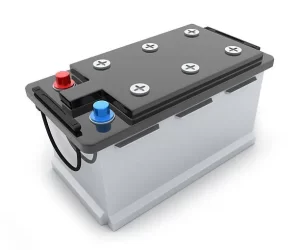Choosing between a gel cell battery and a lithium battery can be challenging. This gel cell battery vs lithium comparison covers energy density, costs, safety, and ideal applications to help you pick the best option for solar systems, RVs, or electric vehicles.
Part 1. What is a gel battery?
A gel battery, also known as a gel cell battery, is a rechargeable battery that utilizes a gel electrolyte instead of a liquid electrolyte. The gel electrolyte is a thick, jelly-like substance that immobilizes the electrolyte, preventing it from spilling or leaking.
Advantages:
- Maintenance-Free: Gel batteries are sealed and require no maintenance, unlike traditional lead-acid batteries, which may need topping up with distilled water.
- Spill-Proof: The gel electrolyte prevents leakage, making gel batteries safer to handle and suitable for use in sensitive environments.
- Deep Cycle Capabilities: Gel batteries are designed for deep discharge and recharge cycles, making them ideal for applications requiring frequent cycling, such as in renewable energy systems.
Disadvantages:
- Sensitivity to Overcharging: Gel batteries are sensitive to overcharging, leading to reduced lifespan and performance if not properly managed.
- Temperature Sensitivity: Gel batteries may perform less well in extreme hot and cold temperatures than other battery types.
- Initial Cost: Gel batteries have a higher upfront cost than traditional lead-acid batteries. However, their maintenance-free nature may offset this over time.
Applications:
- Solar Power Systems: Gel batteries are commonly used in off-grid solar power systems, providing reliable energy storage for residential and commercial applications.
- Recreational Vehicles (RVs): Gel batteries are popular among RV owners for their deep cycle capabilities and maintenance-free operation. They provide power for lighting, appliances, and electronics.
- Marine Applications: Gel batteries are well-suited for marine use due to their spill-proof design and resistance to vibration, making them ideal for powering onboard electronics, navigation systems, and auxiliary equipment on boats and yachts.
Part 2. What is a lithium battery?
A rechargeable lithium battery utilizes lithium ions to store and release electrical energy. These batteries have gained significant popularity due to their high energy density and excellent performance.
Advantages:
- High Energy Density: Lithium batteries have a higher energy density than other rechargeable batteries, which means they can store more energy in a smaller, lighter package.
- Long Lifespan: Lithium batteries typically have a longer lifespan than other types, making them suitable for long-term use in various applications.
- Fast Charging: Lithium batteries can be charged more quickly than other rechargeable batteries, allowing rapid replenishment.
- Low Self-Discharge Rate: Lithium batteries have a low self-discharge rate, meaning they can hold their charge for extended periods when not in use.
- Versatility: Lithium batteries come in various forms and sizes, making them suitable for multiple applications, from small electronic devices to electric vehicles.
Disadvantages:
- Cost: Lithium batteries have a higher upfront cost than other battery types. However, the price has decreased over time as lithium battery technology advances and becomes more widespread.
- Safety concerns: While lithium batteries are generally safe to use, they can be prone to thermal runaway or overheating if they are damaged, improperly handled, or exposed to extreme conditions. However, manufacturers have implemented safety features to mitigate these risks.
Applications:
- Consumer electronics: Lithium batteries are widely used in portable electronic devices such as smartphones, laptops, tablets, and digital cameras due to their high energy density and long-lasting performance.
- Electric vehicles (EVs): Lithium batteries power electric vehicles, providing them with the necessary energy for propulsion. Lithium batteries’ high energy density and fast charging capabilities make them a preferred choice for EV manufacturers.
- Renewable energy storage: Lithium batteries are utilized in renewable energy systems, such as solar and wind power, to store excess energy generated during peak production periods for use during low production periods or at night.
- Aerospace and aviation: Lithium batteries are used in aerospace and aviation applications, including spacecraft, satellites, and uncrewed aerial vehicles (UAVs), due to their lightweight construction and high energy density.
- Medical devices: Lithium batteries are commonly employed in medical devices, such as pacemakers, hearing aids, and portable medical equipment, due to their long cycle life and reliability.
Lithium batteries are widely used in solar storage systems due to their high efficiency.
Part 3. Gel cell battery vs lithium: Head-to-head comparison
| Feature | Gel Cell Battery | Lithium Battery |
|---|---|---|
| Energy Density | Lower (Suitable for stationary setups) | Higher (Ideal for weight-sensitive applications) |
| Lifespan | 3-8 years | 8-15 years |
| Cost (200Ah) | $150-$300 | $500-$1000 |
| Charging Speed | Slower (6-8 hours) | Faster (2-3 hours) |
| Temperature Tolerance | -20°C to 50°C | 0°C to 45°C |
| Best Applications | Solar storage, Marine use | EVs, Portable power stations |
Part 4. Considerations for choosing between gel Batteries and lithium batteries
Energy Density
Lithium batteries have a higher energy density than gel batteries, which can store more energy in a smaller, lighter package. Suppose you need a battery that can provide high energy output while minimizing weight and size. In that case, lithium batteries are a preferred choice.
Weight and size constraints
Suppose you require a lightweight and compact battery. Lithium batteries are generally more favorable due to their higher energy density and smaller form factor. Gel batteries, on the other hand, are bulkier and heavier, which may be better for applications with strict weight or space restrictions.
Cycle Life
Consider the expected usage patterns of your battery. Lithium batteries generally have a longer cycle life than gel batteries, which means they can withstand more charge-discharge cycles before experiencing a significant decline in performance. Lithium batteries may be better if your application requires frequent cycling or long-term durability.
Charging Speed
Lithium batteries typically have faster charging capabilities than gel batteries. They are advantageous if you need a battery that can recharge quickly and minimize downtime.
Maintenance
Gel batteries are generally maintenance-free, not requiring electrolyte additions or specific maintenance tasks. Lithium batteries, on the other hand, also have minimal maintenance needs. Still, they may require periodic monitoring and balancing to ensure optimal performance.
Environmental Considerations
Consider the operating environment in which the battery will be used. Gel batteries perform well in a wide range of temperatures and are more tolerant of extreme conditions. Lithium batteries, however, may have certain temperature limitations, and their performance can be affected in very high or low temperatures.
Cost
Gel batteries are generally more cost-effective upfront compared to lithium batteries. However, it’s essential to consider the long-term value and total cost of ownership. Lithium batteries may offer better overall cost-efficiency despite a higher initial cost due to their longer lifespan and higher energy density.
Safety Considerations
Take into account your application’s safety requirements. Both gel and lithium batteries are generally safe when handled properly. However, lithium batteries have a slightly higher risk of thermal runaway or overheating if damaged or exposed to extreme conditions.
Use Case Recommendations
- For Solar Systems: Gel cell batteries are cost-effective for fixed installations with steady charging.
- For Electric Vehicles: Lithium batteries are lighter and charge faster, improving vehicle range.
Part 5. FAQs: Gel battery vs lithium battery
What is the difference between a gel cell battery and a lithium battery?
Gel cell batteries use a thickened electrolyte gel, cost less upfront, and excel in stable environments like solar storage. Lithium batteries have higher energy density, faster charging, and superior performance in mobile applications like electric vehicles.
How many years will a gel battery last?
With proper maintenance, gel batteries typically last 3-8 years. Deep discharges and extreme temperatures can shorten lifespan.
Are lithium batteries safer than gel batteries?
Gel batteries are inherently safer against leaks and overheating. Lithium batteries require advanced BMS protection but offer better energy efficiency.
Can I replace a gel battery with a lithium battery?
Yes, but ensure your charging system supports lithium chemistry. Lithium batteries need compatible voltage settings to prevent damage.
Which is better for solar power: gel or lithium?
Gel batteries suit budget-focused solar setups with stable charging. Lithium batteries are better for high-usage systems requiring fast charging and long lifespan.
Part 6. Conclusion: Which battery is right for you?
In the gel cell battery vs. lithium debate, prioritize lithium if you need a lightweight design and fast charging. Choose gel batteries for budget-friendly, stable performance in solar or marine use.
Explore 2025’s top lithium batteries for high-performance needs.
Related Tags:
More Articles

How to Choose the Best Floor Scrubber Battery for Commercial Cleaning?
Selecting the ideal floor scrubber battery ensures a long runtime, rapid charging, and minimal maintenance for efficient commercial cleaning operations.
Battery for Blower vs Battery for Leaf Vacuum: Which One Should You Choose?
Battery for blower vs leaf vacuum—learn the key differences in power, fit, and runtime to choose the right battery for your outdoor tool needs.
How to Choose the Right Battery for Blower?
Choosing the right blower battery? Consider voltage, capacity, chemistry & usage. This guide helps match the best battery for peak performance.
How to Choose the Best Insulated Battery Box for Lithium Batteries?
Choosing the Best Insulated Battery Box for Lithium Batteries? Discover key factors such as size, material, and safety for optimal protection and performance.
7 Critical Elements on a Lithium Battery Shipping Label
What must be on a lithium battery shipping label? Learn 7 key elements to ensure safety, legal compliance, and correct handling across all transport modes.





